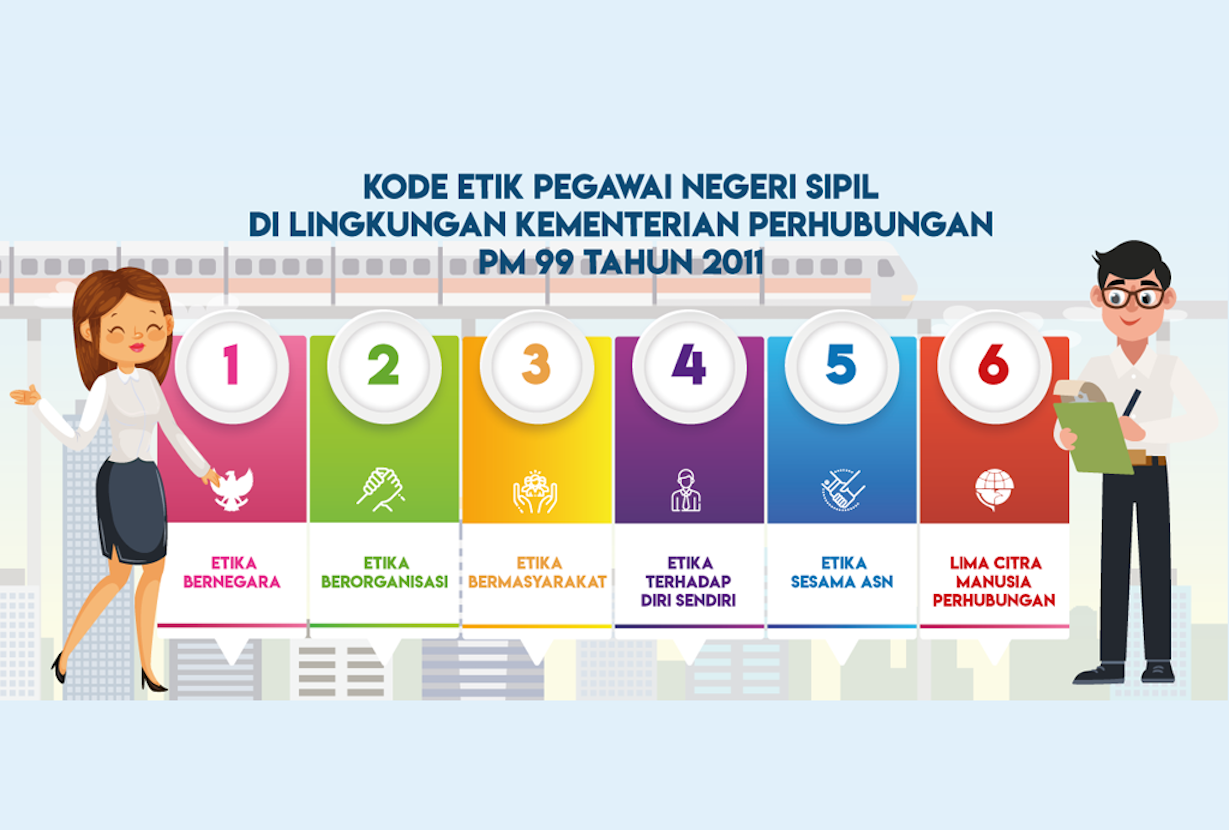
The State Civil Apparatus (ASN) code of ethics in the Ministry of Transportation is a guideline for Civil Servants' attitudes, behavior, and actions in carrying out their duties and daily life, as stipulated in the Minister of Transportation Regulation Number PM 99 of 2011.
The purpose of these rules is to provide guidelines for attitudes, behavior, and actions of the State Civil Apparatus in the life of the state, organization, and society, so that they can carry out their profession properly and in accordance with ethics.
Furthermore, this regulation was created in an effort to prevent ASN from engaging in unethical behavior.
According to PM 99 of 2011, the scope of the code of ethics for the State Civil Apparatus is as follows:
1. State ethics, which includes:
- Implement Pancasila and the 1945 Constitution completely;
- Raising the national and state's dignity;
- To become the nation's glue and unifier in the Unitary State of the Republic of Indonesia;
- Loyal and obedient to the Republic of Indonesia's Unitary State based on Pancasila and the 1945 Constitution;
- Prioritizing the interests of the state over the interests of individuals and groups;
- Comply with all applicable laws and regulations;
- Accountable in carrying out the duties of administering a clean and authoritative government;
- Responsive, open, honest, and accurate in implementing every policy and program of the government; and timely in implementing every policy and program of the government
- Use or make efficient and effective use of all state resources; and
- Do not give false testimony or information that is not true.
2. Organizational ethics, which includes:
- Carry out your responsibilities and authorities in accordance with the law;
- Maintain the confidentiality of information;
- Implement all policies established by the authorized official;
- Develop a work ethic in order to improve organizational performance.
- Working cooperatively with other related work units to achieve goals;
- Have the ability to complete tasks;
- Observe and follow operational standards and work procedures;
- Improve organizational performance by cultivating creative and innovative thinking.
- Dedicated to efforts to improve work quality;
- Maintaining the institution and putting the organization's interests ahead of personal and group interests;
- Creating a harmonious and conducive working environment to ensure task completion; and
- Maintaining and maintaining office facilities and infrastructure for service purposes.
3. Community ethics, which includes:
- Realizing a simple way of life;
- Providing services with empathy, respect, and courtesy without any strings attached or elements of coercion;
- Provide services in a timely, accurate, open, fair, and non-discriminatory manner.
- Reacting to the state of the community environment;
- Oriented society to improve society's welfare;
- Be open and responsive to community criticism, suggestions, complaints, reports, and opinions;
- Contribute to the safety of the community environment; and
- Maintain harmony and mutual respect in the community environment.
4. Self-ethics, which includes:
- Be truthful and open, and don't give out false information.
- Act sincerity and sincerity;
- Avoid clashes between personal, group, or class interests.
- Efforts to improve the quality of knowledge, abilities, skills, and attitudes;
- Maintain physical and spiritual health;
- Have a lot of fighting power;
- Maintain family integrity and harmony;
- Maintain a simple, neat, polite appearance and wear official clothes in accordance with the provisions of the applicable laws and regulations; and
- Protect and maintain the State's goods and assets.
5. State Civil Apparatus Ethics, including:
- Mutual respect for fellow citizens who adhere to various religions/beliefs, cultures, and customs;
- Maintain a sense of unity and oneness among the members of the State Civil Apparatus.
- Mutual respect among coworkers, both vertically and horizontally within a work unit, agency, or between agencies;
- Different points of view should be respected;
- Maintaining ASN's dignity;
- Maintain and establish cooperative cooperation among ASN; and
- The Indonesian Civil Servant Corps, which ensures the realization of solidarity and solidity of all ASN in fighting for their rights.
6. Five Human Images of Transportation, which also serves as the regulation's signature. The Five Images of Human Communication include the following points:
- Fear of God Almighty;
- Responding to the community's needs for orderly, orderly, timely, clean, and comfortable services;
- Resilient in the face of adversity;
- Skilled and agile behavior, friendliness, politeness, and candor; and
- Accountability for the safety and security of transportation services.





